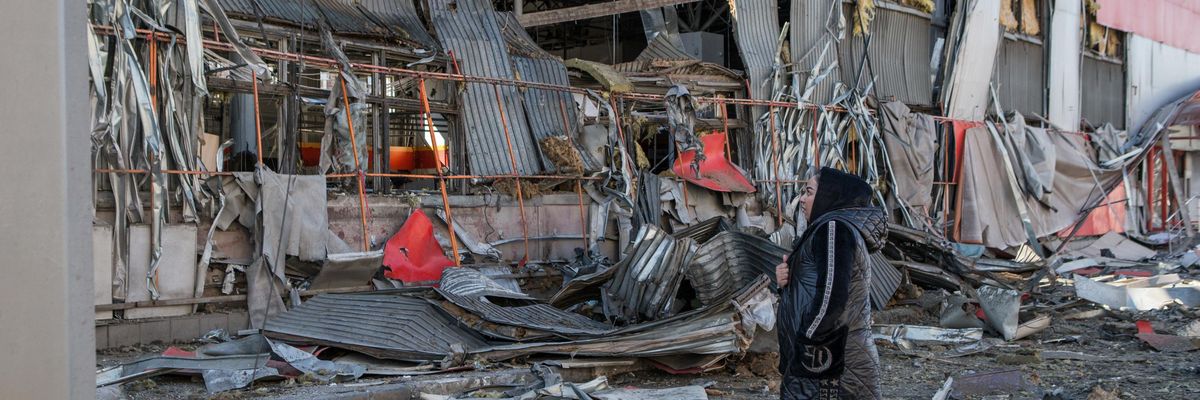Russia's invasion of Ukraine constitutes a crime of aggression under international law. Putin's regime launched an attack on a sovereign country that posed no direct threat to the Russian Federation. Russian forces have pounded cities into submission, thousands of civilians have been killed, and millions have fled as refugees.
Concerned citizens worldwide must embrace wholeheartedly theGlobal Green New Deal project. There is no other viable alternative for a sustainable future.
The war on Ukraine has also fueled a food crisis in developing countries across the world and added to the widespread inflation in food prices. Russia and Ukraine export more than a quarter of the world's wheat. But blockades and sanctions are causing wheat shortages in many Middle East and African countries.
However, the business of war is profitable. Putin's war in Ukraine, which could last for years, is in fact an absolute godsent to the most destructive forces on the planet, namely the arms industry and the fossil fuel companies.
Military expenditure, which reached an all-time high of $2.1 trillion in 2021, will surely rise much further as several European countries have already made plans to beef up their armed forces in response to Russia's invasion of Ukraine. In a historic vote, the German parliament voted for a constitutional amendment to create a $100 billion euro ($112 billion) fund to modernize the country's armed forces. The bulk of the money will go toward the purchase of American-made F-35 fighter jets. German chancellor Olaf Scholtz also promised that Germany would spend more than 2 percent of its gross national product on the military. In real terms, Germany's annual defense spending would increase by 50 percent in 2022 alone," according to Alexandra Marksteiner, researcher at the SIPRI Military Expenditure and Arms Production Program. "This would catapult Germany towards the top of the list of the world's largest military spenders. All else being equal, Germany would rank third--up from seventh in 2020--behind the United States and China and ahead of India and Russia."
Belgium, Italy, Norway, Poland, Romania, and Sweden have also announced a boost to their defense spendings. Indeed, Putin's invasion of Ukraine has managed to revive a "brain-dead" NATO. Even Nordic states with a long history of neutrality are now eager to join the transatlantic alliance.
In the US, where annual increases to the defense budget are routine, the war in Ukraine has created strong bipartisan support for more military spending. The Senate Armed Services Committee on June 16 voted 23-3 to boost funding for military spending by $45 billion over the Biden administration's budget request. If accepted, the bill would raise the defense budget for the fiscal year 2023 to over $817 billion.
The war in Ukraine has also reinvigorated the fossil fuel industry and put climate action and clean energy on the back burner. With gas prices going through the roof, the Biden administration is doing everything possible to boost domestic oil production, which includes issuing drilling permits on federal lands and ordering an unprecedented release of oil from US reserves.
Before the Russian invasion of Ukraine, Biden had also urged OPEC and its allies to boost oil output in an effort to curb soaring gasoline prices. Biden's plea fell on deaf ears, but his plan to visit the Middle East next month seems to have produced a change of heart for OPEC as it has just announced a hike in oil production.
Europe's response to the energy impacts of the war in Ukraine is also shortsighted. Instead of boosting investments on clean energy as part of its goal to break free from Russian fossil fuels, the European Union simply opted to pursue new energy arrangements such as increasing imports of gas from Norway, importing liquified natural gas (LNG) from places like Australia, Qatar, and the United States, and building more LNG terminals. Natural gas may be producing less greenhouse gases than oil and coal, but it is not environmentally friendly.
Worse still, Europe has decided to turn to coal for power generation after Russia's state-owned energy giant Gazprom decided to curb gas supplies to several European Union countries, including Germany.
It is probably still not too late to rescue the planet. But time is surely running out, and no one should expect politicians and bureaucrats to do what must be done to save humanity from climate doom. We can still rescue this planet from global warming through the power that citizens united can have in forcing change.
At this historic juncture, and while we need to end the brutal war in Ukraine without any further delay, concerned citizens worldwide must embrace wholeheartedly the Global Green New Deal project. There is no other viable alternative for a sustainable future.

